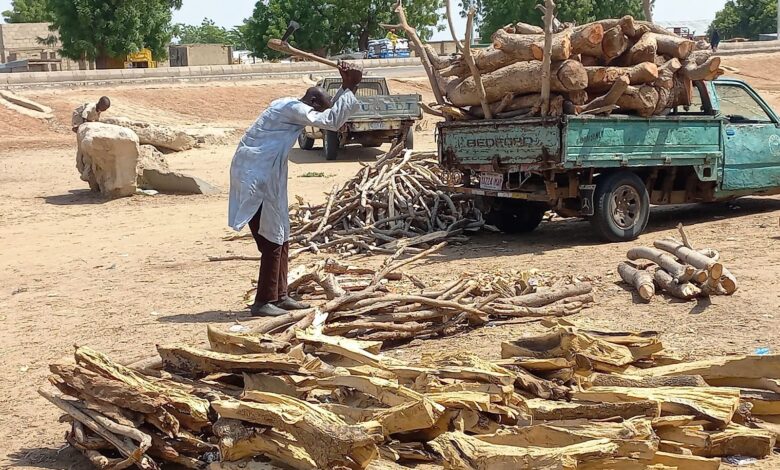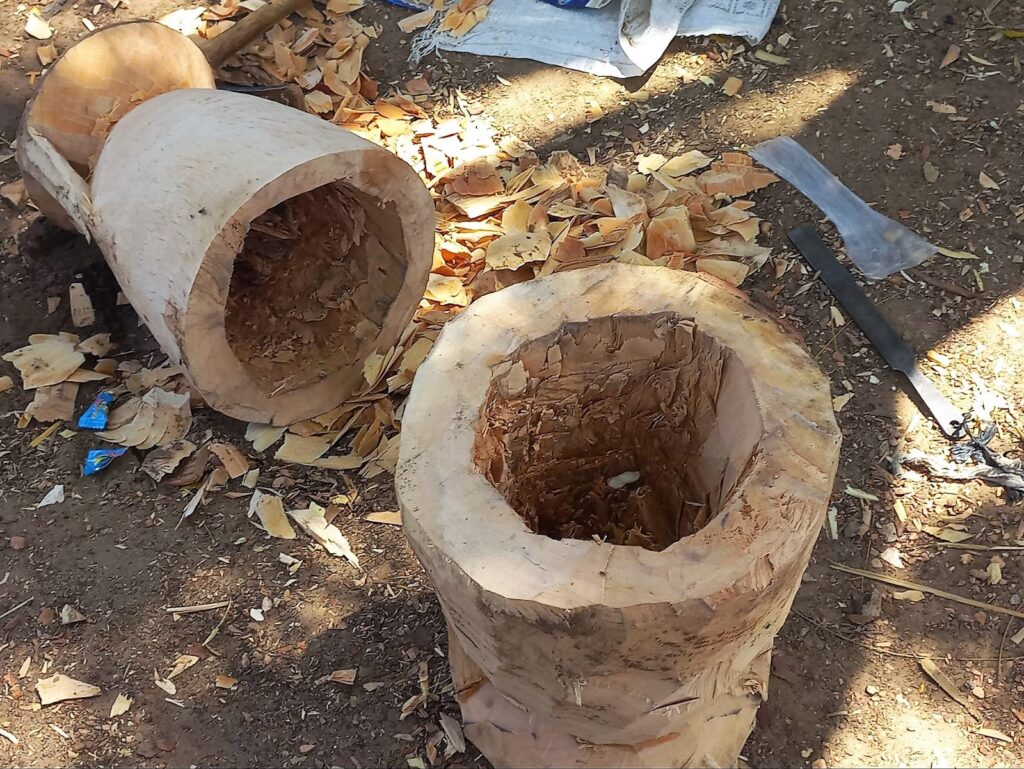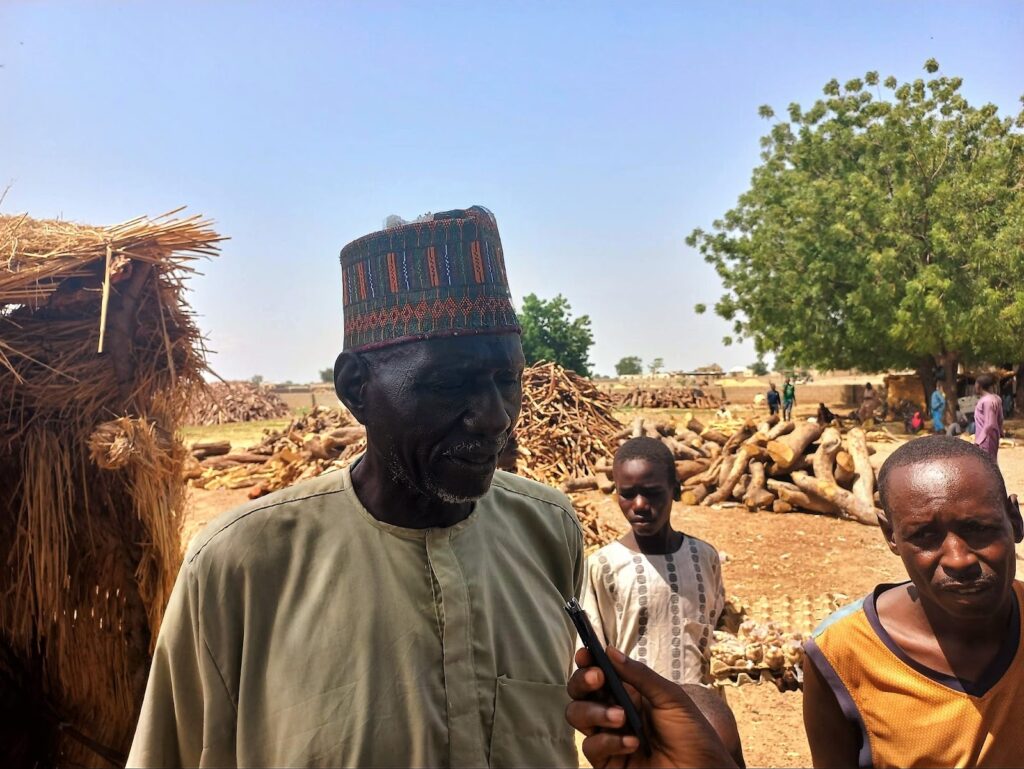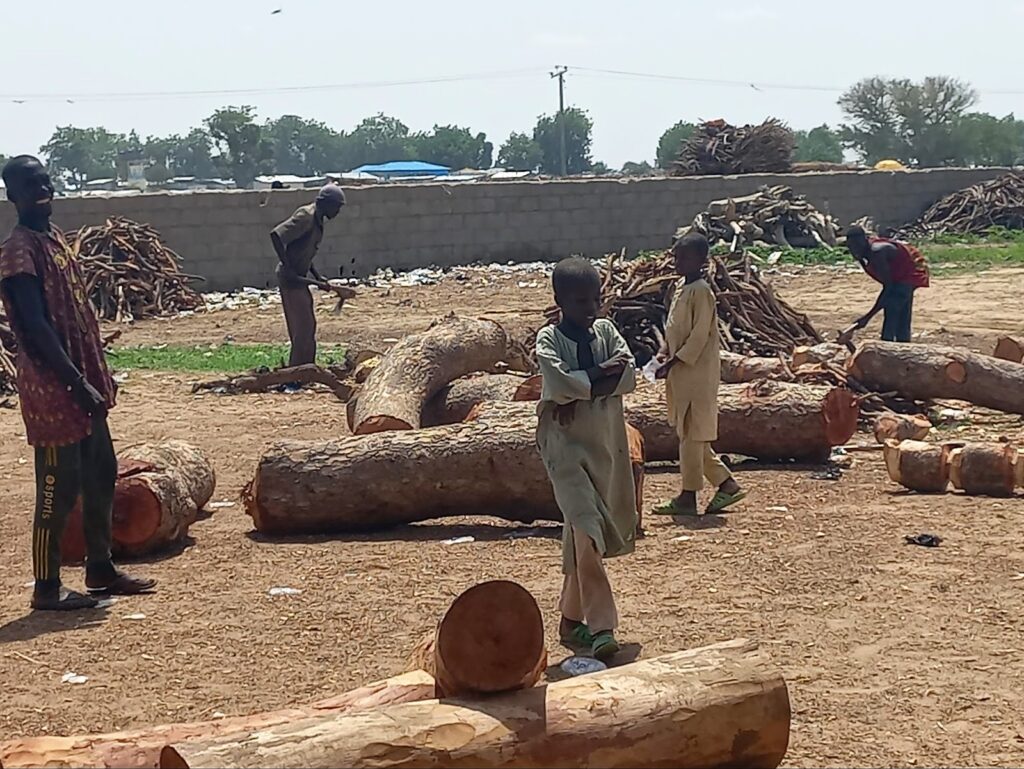Weak Laws, Armed Conflict Worsen Deforestation In Borno
Environmental laws in the northeastern Nigerian state are said to be too weak to prevent tree felling, which has worsened due to years of armed conflict.

It was late afternoon and the sun shone at its peak in Maiduguri, Borno State, but the scorching weather did not discourage locals from going about their daily hustle and bustle.
An old, creaky Toyota pickup truck, overloaded with carefully arranged wood had just arrived at the Muna firewood market from the Mafa axis, along the Maiduguri-Gamboru-Ngala road. A group of elderly men, who had been waiting for its arrival, quickly left the shade of a tree and advanced toward the truck to inspect the consignment. About 15 minutes later another loaded pickup showed up.
“On a good day, we usually receive more than 10 of these pickup loads of firewood here in Muna, and that is aside from the bigger trucks that convey bigger trunks of firewood,” said Ba’Kazalla Ari, 67, an internally displaced person from Mafa and leader of the firewood vendors in his community.
Ever-growing pyramids of firewood, either in their original trunks or split sizes, are a common sight at the market. Young men axed bigger logs for firewood merchants. In one corner, a group of men carved mortars, pestles, hoes, and stools off logs of fresh timber. From time to time, private vehicles parked by the roadside as the owners stopped to buy firewood for their domestic use. Women and children who could not afford to buy scavenged for wood debris to take home.
Ari said he has no other known business aside from selling firewood for a living.
“I’ve been in this business for over four decades now and that’s why I am a chief of the firewood businessmen in my community,” he said.
“It’s what has been keeping my family and I back in Mafa even before we were displaced some years ago. And upon arrival at the camps in Maiduguri, I had no choice but to continue the business despite all the risks involved.”

Ari is among many merchants operating in one of the biggest firewood markets in the Muna Garage area of Maiduguri. Beside the market is the Muna IDP camp where he lived before getting an apartment in the township. Most IDPs depend on the market’s ecosystem for survival.
Especially with the rise in the cost of kerosene and cooking gas, many residents of Maiduguri now depend on firewood to meet their daily cooking needs.
It was gathered that the merchants’ biggest customers are the bakery proprietors and ‘suya’ (roasted beef) joint operators who also depend on wood for their businesses.
“We sell the larger logs that are very hard and slow to burn to the bakery and suya proprietors because over 95 per cent of them depend on local use of wood to bake or roast,” said Abubakar, 39, a truck driver.
“The high demand for firewood, due to poverty and rise in the cost of petrol and kerosene has placed some pressure on the firewood sellers even as the business has become more and more lucrative. The tree fellers now have to travel far into the bushes to cut down firewood, due to its growing shortage.”
Depending on the nature or quality of the wood, a fully loaded pickup truck of firewood goes for as high as ₦50,000 ($117).
“The least you can buy a pickup truck of firewood is ₦40,000 ($94),” said Ari.
There is usually a rush to accumulate more firewood during the dry season because accessing the bush becomes difficult when it rains.
“We don’t normally get a supply of firewood during the rainy season because vehicles usually get stuck in marshy locations, and that allows us time to concentrate on farming,” he said.
This multimillion naira business of tree cutting and the burning of woods for cooking poses a grave threat to the environment as the loss of trees and other vegetation induces negative impacts like the increased circulation of greenhouse gases, climate change, desertification, and flooding.
Many of those who cut the trees, however, seem to be ignorant of these consequences.
“It was not all kinds of trees that we cut,” argued Bukar Masta’a.
“But with the increasing demand and diminishing availability of wood, the younger fellers cut all kinds of trees. We have no option, sometimes, other than to buy them as long as they are ignitable.”
Ari, however, clarified that the government, through the forest guards, usually gives them a list of trees, mostly economic trees, that they are not allowed to cut down.
The Borno state government has laws that govern the use of forest resources and prohibit acts like cutting down trees. But it seems the stipulated sanctions are too passive to ensure compliance.
HumAngle learned from officials at the ministry of environment that a significant number of tree species have been lost to fellers because “people now cut trees right from the roots.”
“We have lost about 80 major tree species because this unwholesome practice of cutting trees has become a livelihood issue and there are no strong laws to curtail this act of destruction of our ecosystem,” said Ahmadu Mafa, Permanent Secretary at the ministry.
“Borno used to have a natural reservation for trees with the abundant forests but these resources are disappearing due to tree cutting. The government has laws prohibiting tree cutting but the laws are too weak to stop deforestation. Imagine a fine of only ₦500 ($1) as the penalty for felling a whole tree.”

When cut down, a big tree can fill up a whole truck, which is valued at around ₦50,000 in the local market.
“A fine of ₦500 cannot prevent a perpetrator from cutting more trees because they can easily pay since they are making so much money off it,” the Permanent Secretary observed.
He said the state needs to review the legislation under the 1994 Laws of Borno State to prevent further deforestation.
Abdulwasiu Alfa, a Maiduguri-based constitutional lawyer, said the fine for deforestation activities is so weak because they were adopted from the 1963 Laws of Northern Nigeria, noting that some of the fines are in foreign currency.
“You can imagine that at this present time of our existence as an independent state, we still have fines in the laws of Borno state that are in pounds and shillings,” said the former chairman of the Nigerian Bar Association (NBA), Maiduguri branch.

Mafa explained that apart from the impact of human activities, ongoing armed conflict in Borno due to the Boko Haram insurgency has also slowed down the government’s afforestation projects.
“The state government has launched a programme to plant 10 million seedlings in two years, but this has not been feasible due to insecurity,” the permanent secretary said.
The government had in June 2020 commenced the 10 million tree planting project with the first phase of one million trees to be planted in the northern part of the state for the desertification control programme.
The following year, it launched the planting of another one million trees across the state and so far it is not close to meeting the goal of planting up to 10 million.
“We normally start planting or distributing tree seedlings in August when the rains are heavier, but with the insecurity, we cannot reach our designated shelterbelt communities where most of the trees are planted to control desertification,” Mafa said.
Despite the negative impacts of their trade on the environment, the firewood cutters insist they operate within the confines of the law.
“We pay ₦10,000 annually to the local government council officials who issue us receipts that serve as permits to cut trees,” Ari told HumAngle.
“We give some cash tips to the police and military personnel at the checkpoints along the way to avoid problems. We also partake in planting trees each time the government wants us to do so. They usually give us the seedling and we know the best locations to take them for planting in the bush.”
The wood merchant added the forest guards usually give them a list of specific trees that are forbidden for cutting, so they stick to trees such as the Adduwa, Gawashi, Kanga, Marke, Danya, and Mariya.
“We don’t go to the bush without the permission of the government and we ensure it is not all trees that are cut down.”
Support Our Journalism
There are millions of ordinary people affected by conflict in Africa whose stories are missing in the mainstream media. HumAngle is determined to tell those challenging and under-reported stories, hoping that the people impacted by these conflicts will find the safety and security they deserve.
To ensure that we continue to provide public service coverage, we have a small favour to ask you. We want you to be part of our journalistic endeavour by contributing a token to us.
Your donation will further promote a robust, free, and independent media.
Donate HereStay Closer To The Stories That Matter




